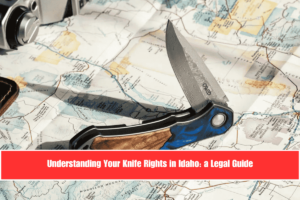When it comes to knife laws in the United States, each state has its own set of rules. If you live in or are visiting Vermont, you’ll be happy to know that the state has some of the most relaxed and straightforward knife laws in the country.
Let’s break down the key points so you can carry and use knives legally and responsibly in Vermont.
What Types of Knives Are Legal in Vermont?
Vermont does not ban any specific type of knife. That means you can legally own, carry, and possess nearly all common knives, including:
- Pocket knives
- Utility knives
- Hunting knives
- Bowie knives
- Dirks and daggers
There are no laws against owning switchblades, gravity knives, or butterfly knives, as long as you’re not using them to threaten or harm others.
Carrying Knives in Vermont: Open vs. Concealed
Open Carry
You are legally allowed to openly carry a knife in Vermont, regardless of the blade size. However, if you’re carrying a knife in public, your intent matters. If you’re carrying with the intent to harm, that’s a criminal offense.
Concealed Carry
Vermont also allows the concealed carry of knives without a permit. But again, using the knife to threaten or hurt someone can turn a legal act into a serious crime.
So whether you carry a knife in your pocket, bag, or on your belt — what truly matters is why you’re carrying it.
Places Where Carrying a Knife Is Restricted
While Vermont is permissive, there are still some places where knives are not allowed, such as:
- Schools and school zones
- Government buildings (like courthouses and state offices)
- Correctional facilities
- Private property where owners prohibit weapons
Even if you’re carrying legally, doing so in these places could result in criminal charges or being asked to leave.
Exceptions for Law Enforcement and Military
Law enforcement officers and military personnel on duty are exempt from most knife restrictions in Vermont. This means they can carry knives in areas where civilians cannot, as long as it’s part of their official responsibilities.
What Happens If You Break Vermont’s Knife Laws?
Although Vermont’s laws are flexible, violating them can lead to serious penalties, especially if the knife is involved in a crime. Consequences may include:
- Criminal charges (misdemeanor or felony)
- Fines
- Jail or prison time
- A permanent criminal record
Using a knife in a threatening or violent manner will almost always result in harsher punishment than simply carrying it without harm or intent.
FAQs
Q1. Are knives with large blades legal in Vermont?
Yes, Vermont does not restrict blade length, so even large knives like Bowie knives are legal.
Q2. Can I carry a switchblade in Vermont?
Yes. Switchblades and automatic knives are legal, as long as they are not used to harm or threaten.
Q3. Do I need a permit to carry a knife in Vermont?
No. You can carry knives openly or concealed in Vermont without a permit.
Q4. Can I bring a knife to school in Vermont?
No. Carrying a knife on school grounds is strictly prohibited, regardless of the blade size or your intent.
Q5. What’s the biggest legal concern about carrying a knife in Vermont?
The biggest concern is intent. If you’re carrying a knife to threaten or commit a crime, you can face serious charges.


















Leave a Reply